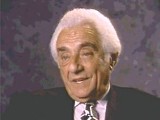You searched for: Liberation
<< Previous | Displaying results 1141-1150 of 1269 for "Liberation" | Next >>
-
Abraham Lewent recalls how, while ill with typhoid, he persuaded the Skarzysko doctor that he was fit to work
Oral HistoryLike other Jews, the Lewents were confined to the Warsaw ghetto. In 1942, as Abraham hid in a crawl space, the Germans seized his mother and sisters in a raid. They perished. He was deployed for forced labor nearby, but escaped to return to his father in the ghetto. In 1943, the two were deported to Majdanek, where Abraham's father died. Abraham later was sent to Skarzysko, Buchenwald, Schlieben, Bisingen, and Dachau. US troops liberated Abraham as the Germans evacuated prisoners.
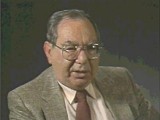
-
Chaim Engel describes arrival in Sobibor
Oral HistoryIn 1939, as Chaim's tour in the Polish army was nearing its scheduled end, Germany invaded Poland. The Germans captured Chaim and sent him to Germany for forced labor. As a Jewish prisoner of war, Chaim later was returned to Poland. Ultimately, he was deported to the Sobibor camp, where the rest of his family died. In the 1943 Sobibor uprising, Chaim killed a guard. He escaped with his girlfriend, Selma, whom he later married. A farmer hid them until liberation by Soviet forces in June 1944.
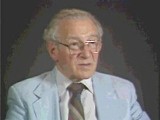
-
Felix Horn describes postwar emigration with the Brihah movement and adjustment to life after the war
Oral HistoryFelix was born to an assimilated Jewish family in Lublin, Poland. His father was a locksmith and his mother was a singer. Following the German invasion of Poland on September 1, 1939, Felix fled east to Rovno and then to Soviet-occupied Lvov, where he was accepted at a medical school. After the German invasion of the Soviet Union in June 1941, Felix was taken to a labor camp. He escaped and returned to Lublin, and found that his family had been forced into the ghetto established there. After the…
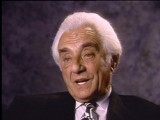
-
Bart Stern describes the role of friendships in survival at Auschwitz
Oral HistoryFollowing the German occupation of Hungary in March 1944, Bart was forced into a ghetto established in his home town. From May to July 1944, the Germans deported Jews from Hungary to the Auschwitz killing center in occupied Poland. Bart was deported by cattle car to Auschwitz. At Auschwitz, he was selected to perform forced labor, drilling and digging in a coal mine. As Soviet forces advanced toward the Auschwitz camp in January 1945, the Germans forced most of the prisoners on a death march out of the…
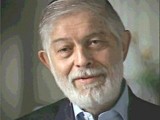
-
Cecilie Klein-Pollack describes survival with her sister in Auschwitz
Oral HistoryCecilie was the youngest of six children born to a religious, middle-class Jewish family. In 1939, Hungary occupied Cecilie's area of Czechoslovakia. Members of her family were imprisoned. The Germans occupied Hungary in 1944. Cecilie and her family had to move into a ghetto in Huszt and were later deported to Auschwitz. Cecilie and her sister were chosen for forced labor; the rest of her family was gassed upon arrival. Cecilie was transferred to several other camps, where she labored in factories. Allied…
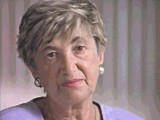
-
Ruth Meyerowitz describes surviving a selection for the gas chamber
Oral HistoryIn Frankfurt, Ruth's family faced intensifying anti-Jewish measures; her father's business was taken over and Ruth's Jewish school was closed. In April 1943, Ruth and her family were deported to Auschwitz. Ruth was selected for forced labor and assigned to work on road repairs. She also worked in the "Kanada" unit, sorting possessions brought into the camp. In November 1944, Ruth was transferred to the Ravensbrueck camp system, in Germany. She was liberated in May 1945, during a death march from the…
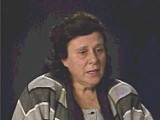
-
Cecilie Klein-Pollack describes mother's actions to save Cecilie's sister's life upon arrival at Auschwitz
Oral HistoryCecilie was the youngest of six children born to a religious, middle-class Jewish family. In 1939, Hungary occupied Cecilie's area of Czechoslovakia. Members of her family were imprisoned. The Germans occupied Hungary in 1944. Cecilie and her family had to move into a ghetto in Huszt and were later deported to Auschwitz. Cecilie and her sister were chosen for forced labor; the rest of her family was gassed upon arrival. Cecilie was transferred to several other camps, where she labored in factories. Allied…
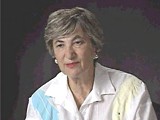
-
Thomas Buergenthal describes being reprieved from a massacre of children while he was in a forced-labor camp in Kielce
Oral HistoryThomas's family moved to Zilina in 1938. As the Slovak Hlinka Guard increased its harassment of Jews, the family decided to leave. Thomas and his family ultimately entered Poland, but the German invasion in September 1939 prevented them from leaving for Great Britain. The family ended up in Kielce, where a ghetto was established in April 1941. When the Kielce ghetto was liquidated in August 1942, Thomas and his family avoided the deportations to Treblinka that occurred in the same month. They were sent…
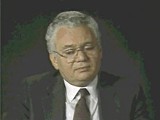
-
Bart Stern describes deportation to Auschwitz
Oral HistoryFollowing the German occupation of Hungary in March 1944, Bart was forced into a ghetto established in his home town. From May to July 1944, the Germans deported Jews from Hungary to the Auschwitz killing center in occupied Poland. Bart was deported by cattle car to Auschwitz. At Auschwitz, he was selected to perform forced labor, drilling and digging in a coal mine. As Soviet forces advanced toward the Auschwitz camp in January 1945, the Germans forced most of the prisoners on a death march out of the…
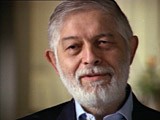
-
Felix Horn describes attempt to flee from the Majdan Tatarski ghetto
Oral HistoryFelix was born to an assimilated Jewish family in Lublin, Poland. His father was a locksmith and his mother was a singer. Following the German invasion of Poland on September 1, 1939, Felix fled east to Rovno and then to Soviet-occupied Lvov, where he was accepted at a medical school. After the German invasion of the Soviet Union in June 1941, Felix was taken to a labor camp. He escaped and returned to Lublin, and found that his family had been forced into the ghetto established there. After the…
